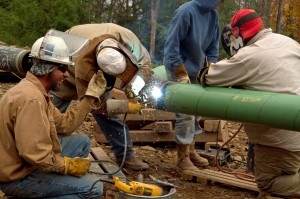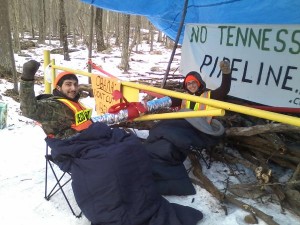Pennsylvania DEP trying to forge new strategy for pipelines
-
Susan Phillips
John Quigley, Acting Secretary for the Department of Environmental Protection, says he wants to try to incorporate planning strategies for what some say is now a maddening and chaotic rush to build new natural gas pipelines across every county in Pennsylvania.
“We’re not under any illusion to reduce impact to zero,” Quigley told StateImpact. “There’s going to be impact but are there opportunities to plan smarter? Share rights of way for example? Can companies work together to optimize development? I don’t know the answers to those questions but I think they’re worth asking.”
Quigley says he wants to get the pipeline companies, and local authorities to sit down together at the table and start a conversation. It would be completely voluntary. That’s because states don’t have authority when it comes to large interstate pipeline construction. The Federal Energy Regulatory Commission, or FERC, makes decisions on pipelines. Rules and regulations are set by the Pipeline and Hazardous Material Safety Administration, or PHMSA. But Quigley says the companies so far have responded enthusiastically. Grassroots opposition to new pipeline projects has reached a fevered pitch in some parts of the state, in part due to the fact that local authorities have little to no impact on the projects and local residents have expressed frustration with trying to influence the FERC process.
“We’re not contemplating any additional regulatory action or regulatory grab,” said Quigley. “This is about having a conversation to see if we can facilitate this whole development process in a way that makes sense for everybody.”
It won’t be easy. And Quigley knows that.
Pennsylvania’s natural gas pipeline building boom will add more than 4,000 miles of interstate pipe by 2018, according to the Energy Information Administration. Add to that tens of thousands of miles of natural gas gathering pipelines, those connect the wellhead to the transmission lines, and a complex regulatory system, where federal authorities have the final say on new interstate pipelines and facilities. The Pennsylvania Public Utilities Commission is responsible for inspecting some but not all of the states pipelines, while a growing number of gathering lines fall within no agency’s regulatory oversight. And try to find one master map of all these lines. Impossible.
No master plan exists to approve, inspect or oversee current or new pipelines. But gas producers have a strong incentive to build them. Overproduction in the Marcellus Shale has helped drive down the price of natural gas nationwide, but even more so locally. Without more pipelines to take the gas to new markets both domestically and overseas, the price will remain low.
Quigley says he doesn’t see himself as the arbiter of disputes between the bevy of new opposition groups and the pipeline operators. Instead, he says he wants to come as close as possible to a “win-win” as he can.
“Pipelines are going to have big environmental impacts as well as big economic implications,” he said.”The goal is to reduce the environmental impact and facilitate development. And finding that sweet spot, that would be a great success.”
Governor Wolf has staked his budget on funds from a new natural gas tax, which of course, relies on a thriving natural gas industry. So Wolf is in the position of encouraging industry, while making good on his campaign promise to protect the environment and public health. Pipelines heading toward Philadelphia would also help make the city an “energy hub,” where some have pushed to increase manufacturing and spur job creation. In Pennsylvania, pipelines are not subject to property tax as they are in other states like New Jersey. And some pipeline companies have begun doling out community grants, similar to what casinos often do when they build in hostile territory.
With the main pipeline regulatory machine down in D.C., Acting Secretary Quigley says the best way to bring some forethought and planning to the pipeline boom is to bring all the stakeholders, including environmentalists, around the same table and try to find some common ground. Quigley says he has experience with this. As head of the Department of Conservation and Natural Resources under the Rendell Administration, he conducted similar discussions with the wind power industry and the game commission.
“We worked out a set of siting standards that to this day I think are the best in the country.”
Quigley says the newly appointed deputy secretary for programs, Denise Brinley, will lead the project. Brinley has experience at both DEP and with the private sector. While at DEP, Brinley helped run the brownfields development program, which utilized public private partnerships to remediate polluted lands.


















